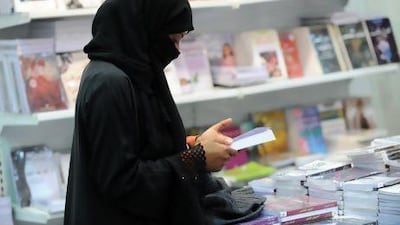In Saudi Arabia, the decision to reform is sometimes the easy part.
Take, for example, the announcement by King Abdullah bin Abdulaziz this year that women would join the Shura Council in 2013 and be allowed to vote in municipal elections in 2015.
The king's announcement was met almost immediately with criticism from conservatives. A senior imam, Sheikh Saleh Al Lohaidan, warned that "the thread between a leader and his people" could break if stretched too far.
Last month, the pendulum swung again, as authorities announced that the new female members of the Shura Council would be separated from their male colleagues to avoid gender mixing.
The push and pull over women's rights illustrates the process of reform in the kingdom. Straddling a delicate line between liberal demands, modern economic realities and traditional mores, the government's efforts at overseeing change in the kingdom are halting and, for some Saudis, frustrating.
Nevertheless, the impetus for change in Saudi Arabia is inescapable with more, particularly young, Saudis less willing to accept backlash as a reason not to move forward with proposed reforms. Their demands do not fall into the usual baskets of liberal or conservative, but instead focus on the nagging issues that weigh on daily lives: an inefficient bureaucracy, unemployment, a ban on female driving that forces many to hire chauffeurs, expensive housing and corruption.
"It's about questions of governance, the application of Islamic law, corruption - those are the issues that Islamists have raised, not questions of being more liberal, more tolerant," said Bernard Haykel, a professor of Near Eastern studies at Princeton University.
Mr Haykel said that these demands may be harder to solve. "It's actually much more threatening. Corruption is a very big issue and it's something that has to do with the nature of the ruling family."
For some Saudis, conservative resistance is a justification overused by the government to explain the languid pace of reform.
"They use this excuse of conservative backlash to explain why there are no reforms when they talk to western media," argues Waleed Abu Al Khair, a Jeddah-based lawyer and head of the organisation Monitor of Human Rights in Saudi Arabia. "But my wife has driven many times in Jeddah, and the problem didn't come from society. The only problem she got was from the court."
During his seven years on the throne, King Abdullah has developed a reputation as a moderate reformer, a tenor set just days after he assumed power. Saudi Arabia joined the World Trade Organisation in 2005 — a move that had required years of economic and labour reforms, much of it shepherded by the then Crown Prince Abdullah.
More changes came in 2009 and 2010, when he shuffled the country's leadership to include several new, reform-minded ministers, including the first female deputy minister of education, and reined in the country's religious establishment by limiting to a few those who could issue fatwas. He has made numerous pledges to contain the power of the religious police.
Backlash of some degree has followed each move. When the King Abdullah University for Science and Technology opened in 2009, a leading imam, Sheikh Saad Al Shethry, bemoaned on Saudi television that the campus was not gender segregated. Just two weeks after the university opened, Sheikh Al Shethry was very publicly sacked.
Even more seemingly cosmetic shifts, such as the kingdom's allowing two women to compete in the summer Olympic Games in London this year, met strong resistance. Conservative Twitter users decried the two female athletes as immodest; so great was the ridicule that the father of judo competitor Wodjan Ali Seraj Abdulrahim Shahrkhani promised to sue insulters.
Other targets for conservative ire included the Jeddah film festival and the Riyadh book fair, both targeted for perceived dabbling in morally and socially taboo conversations. "Conservative Wahhabi scholars have long viewed the book fair as a source of deviation, describing [one year's] book fair as a place where you could find 'books of moral and intellectual deviance,'" a report by Clingendael, a research institute in Norway said. The Jeddah festival was cancelled in 2009.
Since the Arab Spring swept the region with fervour for change, some western analysts have argued that the kingdom will have to find a way to reform too, fast-tracking the slow-motion developments.
But the changes may not be what they expect. Throughout Saudi Arabia's history as a modern state, the greatest challenges to power have often come from conservative - rather than liberal - camps. Many of the reform demands that now seem most pressing began there, though they extend across society.
Corruption is a particularly hot issue. Last month, an official at the Council of Saudi Chambers of Commerce, Maghawri Shalabi, told local Saudi media that per capita income could triple if the kingdom rooted out all administrative and financial corruption.
Nodding to a growing demand, last year Saudi Arabia launched a national anti-corruption agency. But the reaction on social media has been ridicule rather than appreciation. One parody video on YouTube mocking the commission's ability to crack down has had 4.2 million hits since it was posted in the spring.
A housing shortage may prove equally difficult to address.
"The lack of home ownership in Saudi Arabia is the highest in the region," said Mohammed Fahad Al Qahtani, founder of the Saudi Civil and Political Rights Association. "Why? Because those who own land are very powerful and they can confiscate land. Reform will mean the regime must relinquish power, must make compromises. So far, nothing like this has been done."
A different sort of backlash might follow these more structural changes, says Mr Al Qahtani: an internal one. This is why one of his strategies is to seek allies within the government who share similar concerns.
"We are telling the regime, we're not against you, just against abuses, corruption, and depriving people of their rights," he said.

